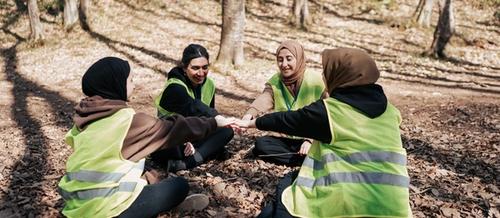
Creative embodied group supervision for counsellors, therapists and allied health
Join a small group of peers to learn, explore, connect, express and reflect through shared discussion, music and creative arts experiences.

Our microculture should support us in two ways: by showering us with encouragement and by holding us accountable.
We know from previous blogs the important role that collective care plays in:
As recently discussed, ideas of collective care can help us to "conceptualise a different type of peer support, one that offers and invites:
Inspired by thinkers and activists such as Brené Brown, Vikki Reynolds, Laura van Dernoot Lipsky, Alex Iantaffi and MegJohn Barker, and Emily and Amelia Nagoski, here at Tempo we have a developed our own conceptual framework for collective care integrating and extending the principles outlined below.
Brené Brown's concept of 'true belonging', 'strong back, soft front, wild heart', originates in Zen Buddhist ideas, articulated here by Roshi Joan Halifax:
All too often our so-called strength comes from fear not love; instead of having a strong back, many of us have a defended front shielding a weak spine. In other words, we walk around brittle and defensive, trying to conceal our lack of confidence. If we strengthen our backs, metaphorically speaking, and develop a spine that's flexible but sturdy, then we can risk having a front that's soft and open, representing choiceless compassion. The place in your body where these two meet - strong back and soft front - is the brave, tender ground in which to root our caring deeply.
Brown adds to the 'strong back, soft front', the wild heart: advocating for the courage to be true to your values and for what you believe in, whether or not you are supported by those around you.
This place of courage, grief and belonging to one's self Brown identifies as the place of true belonging.
We know that the accumulation of stress in our bodies is bad for our health, that the stress response can remain in our system as a chemical stew long after the stressor has been removed, and in order to shift stress, we need to complete the stress response cycle.
For a more detailed review please see here, but the seven ways to complete the stress response cycle include:
Bringing a social justice and ethical lens to a practice of collective care is essential for safe, sustainability in the work.
This frame adds to the strong back that is required to:
A collective ethical frame acknowledges the politics of power and privilege in which we work, and strengthens us individually and collectively for the wellbeing of our clients / patients, and for our longevity in the work.
Whilst these concepts are likely familiar to many of you in terms of the work of the above thought leaders, here at Tempo we are integrating aspects from each to support our own unique approach to developing a practice of collective care that advocates:
Core values that formulate our basis for collective care are outlined below:

Collective care invites us to shoulder each other up, work in solidarity as a collective project and acknowledge that we are not going to stay with sustainability and be useful across the long haul individually.

Creative embodied group supervision for counsellors, therapists and allied health
Join a small group of peers to learn, explore, connect, express and reflect through shared discussion, music and creative arts experiences.

'Stress Response Series' Part 2: four key points about the stress response cycle
In their wonderfully accessible book, 'Burnout: solve your stress cycle', sisters Emily and Amelia Nagoski take us on a delightful romp through all things related to stress, burnout and 'solving your stress cycle' - quite a feat given the subject matter! The key messages this book are really helpful in understanding how we can best support ourselves, manage stress and work through the emotional exhaustion that is so huge for many right now. So what are the four key factors in managing our stress response?

For too long there has been a focus on self care when we work in systems with groups of people, in community. We know that community, authentic connection and support are essential for our survival: the pandemic taught us just how vital we are for each other, and polyvagal theory confirms that the need to come together for safety and support is built into our neurobiology. So what is collective care? What does it mean? Why is it so important? Take a look below to find out more.
Header image: Unsplash in collaboration with Getty Images